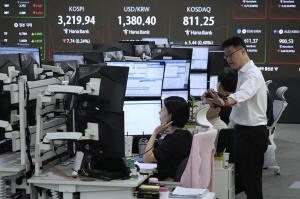Asian shares are mostly lower, while Tokyo's Nikkei jumps nearly 2%
[August 08, 2025] By
TERESA CEROJANO
MANILA, Philippines (AP) — Asian shares were mostly lower Friday while
Tokyo’s benchmark spiked by more than 2% after Japanese officials said
they had resolved questions over the tariff that will apply to exports
to the U.S.
The new U.S. tariffs on Japanese goods that took effect Thursday did not
match an agreement between Washington and Tokyo on a 15% level, and
Japan’s main trade envoy said the U.S. side had agreed to correct the
problem.
The Nikkei 225 in Tokyo rose 2.2% but later trimmed some of its gains,
adding 1.9% to 41,820.48. Toyota Motor Corp. jumped 3.5% and Honda Motor
Co. was up 4%. Automakers are among the manufacturers with the most at
stake regarding exports to the U.S.
Elsewhere in Asia, most markets slipped following declines on Wall
Street.
Hong Kong's Hang Seng declined 1% to 24,841.32, while the Shanghai
Composite index shed 0.3% to 3,635.13.
South Korea's Kospi fell 0.6% to 3,210,01. In Australia, the S&P/ASX 200
slipped 0.3% to 8,807.10.
Taiwan's Taiex gained 0.1% and the Sensex in India was down 0.7%.
“We’re heading into a stretch where markets will punish certainty. The
momentum winds are shapeshifters—what looks like a slam dunk on Monday
can turn into a face plant by Friday,” Stephen Innes of SPI Asset
Management said in a commentary.

On Thursday, the S&P 500 edged 0.1% lower and the Dow industrials dipped
0.5%. The Nasdaq composite rose 0.3% to a record as shares in Apple and
some computer chip makers soared.
Intel sank 3.1% after Trump called for its CEO to resign, while accusing
him of being “highly CONFLICTED,” though he gave no evidence.
But Apple rose 3.2% after its CEO Tim Cook joined Trump at the White
House on Wednesday to say it’s increasing its investment in U.S.
manufacturing by an additional $100 billion over the next four years.
[to top of second column] |

Currency traders work near a screen showing the Korea Composite
Stock Price Index (KOSPI), top left, and the foreign exchange rate
between U.S. dollar and South Korean won, top center, at the foreign
exchange dealing room of the Hana Bank headquarters in Seoul, South
Korea, Friday, Aug. 8, 2025. (AP Photo/Ahn Young-joon)
 Computer chip makers with big
investments or manufacturing capacity in the U.S. surged higher
after Trump ordered 100% tariffs on imported semiconductors but said
companies with big U.S. investments would be exempt. Shares in
Advanced Micro Devices jumped 5.7% and Nvidia gained 0.8%.
A worse-than-expected report on the U.S. jobs market last week added
to worries that President Donald Trump's tariffs are damaging the
economy. But hopes for coming cuts to interest rates by the Federal
Reserve and a torrent of stronger-than-expected profit reports from
big U.S. companies are helping to offset those concerns.
Lower interest rates can give the economy and investment prices a
boost, though the downside is that they can also push inflation
higher at a time when tariffs are also pushing prices up.
The Bank of England cut its main interest rate on Thursday in hopes
of bolstering the sluggish U.K. economy.
In other dealings on Friday, U.S. benchmark crude oil shed 15 cents
to $63.73 per barrel. Brent crude, the international standard, lost
11 cents to $65.32 per barrel.
The U.S. dollar rose to 147.32 Japanese yen from 147.13 yen. The
euro slipped to $1.1658 from $1.1667.
All contents © copyright 2025 Associated Press. All rights reserved |